
The Immigration and Nationality Act of 1965, also known as the Hart–Celler Act and more recently as the 1965 Immigration Act, was a federal law passed by the 89th United States Congress and signed into law by President Lyndon B. Johnson. The law abolished the National Origins Formula, which had been the basis of U.S. immigration policy since the 1920s. The act formally removed de facto discrimination against Southern and Eastern Europeans as well as Asians, in addition to other non-Western and Northern European ethnicities from the immigration policy of the United States.

Peter Wallace Rodino Jr. was an American politician who was a member of the United States House of Representatives from 1949 to 1989. A liberal Democrat, he represented parts of Newark, New Jersey and surrounding Essex and Hudson. He was the longest-serving member of the House of Representatives from New Jersey until passed by Chris Smith in 2021.

William Huston Natcher was a Democratic congressman, serving in the United States House of Representatives from 1953 until his death from heart failure in Bethesda, Maryland in 1994. He is the second longest-serving member ever of the United States House of Representatives from the Commonwealth of Kentucky.

Jacob Koppel Javits was an American lawyer and politician from New York. During his time in politics, he served in both chambers of the United States Congress, a member of the United States House of Representatives from 1947 to 1954 and a member of the United States Senate from 1957 to 1981. A member of the Republican Party, he also served as Attorney General of New York from 1955 to 1957. Generally considered a liberal Republican, he was often at odds with his own party. A supporter of labor unions, the Great Society, and the civil rights movement, he played a key role in the passing of civil rights legislation. An opponent of the Vietnam War, he drafted the War Powers Resolution in 1973.

Jack Bascom Brooks was an American Democratic Party politician from the state of Texas who served 42 years in the United States House of Representatives, initially representing Texas's 2nd congressional district from 1953 through 1967, and then, after district boundaries were redrawn in 1966, the 9th district from 1967 to 1995. He had strong political ties to other prominent Texas Democrats, including Speaker of the House Sam Rayburn and President Lyndon B. Johnson. For over fifteen years, he was the dean of the Texas congressional delegation.

Jerrold Lewis Nadler is an American lawyer and politician who since 2023 has served as the U.S. representative for New York's 12th congressional district, which includes central Manhattan. A member of the Democratic Party, he was first elected to Congress in 1992 to represent the state's 17th congressional district, which was renumbered as the 8th district from 1993 to 2013 and as the 10th from 2013 to 2023. Nadler chaired the House Judiciary Committee from 2019 to 2023. In his 17th term in Congress, Nadler is the dean of New York's U.S. House delegation. Before his election to Congress, he served eight terms as a New York State Assemblyman.
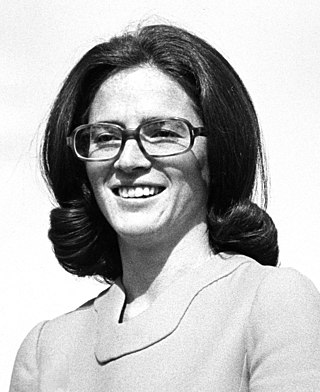
Elizabeth Holtzman is an American attorney and politician who served in the United States House of Representatives from New York's 16th congressional district as a member of the Democratic Party from 1973 to 1981. She then served as district attorney of Kings County from 1982 to 1989, and as the 40th Comptroller of New York City from 1990 to 1993.

The Immigration and Nationality Act of 1952, also known as the McCarran–Walter Act, codified under Title 8 of the United States Code, governs immigration to and citizenship in the United States. It came into effect on June 27, 1952. The legislation consolidated various immigration laws into a single text. Officially titled the Immigration and Nationality Act, it is often referred to as the 1952 law to distinguish it from the 1965 legislation. This law increased the quota for Europeans outside Northern and Western Europe, gave the Department of State authority to reject entries affecting native wages, eliminated 1880s bans on contract labor, set a minimum quota of one hundred visas per country, and promoted family reunification by exempting citizens' children and spouses from numerical caps.

The 89th United States Congress was a meeting of the legislative branch of the United States federal government, composed of the United States Senate and the United States House of Representatives. It met in Washington, D.C., from January 3, 1965, to January 3, 1967, during the second and third years of Lyndon B. Johnson's presidency. The apportionment of seats in the House of Representatives was based on the 1960 United States census.
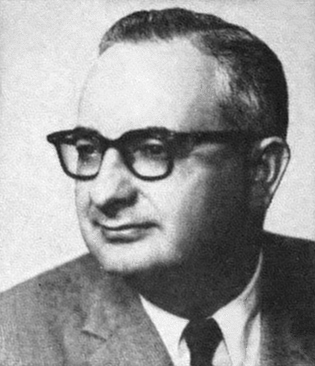
Herman Toll was an American politician who served Pennsylvania in the United States House of Representatives from 1959 to 1967. A member of the Democratic Party, he supported the civil rights movement, and sponsored legislation to create several federal agencies, including the U.S. Department of Urban Affairs and Housing.

Joshua Eilberg was a Democratic member of the U.S. House of Representatives from Pennsylvania.

Edna Flannery Kelly was an American politician who served ten terms as a Democratic member of the United States House of Representatives from New York from 1949 to 1969.

Lester Holtzman was an American lawyer, jurist, and politician. He served four terms in the United States House of Representatives from 1953 to 1961. He was later a justice of the New York Supreme Court, serving from 1962 until 1973.

John Henry Ray was an American lawyer, business executive, and politician who served as a U.S. Representative from New York as a member of the Republican Party. He served five terms in Congress representing the state's 15th district, which at the time encompassed parts of Staten Island and Brooklyn.

The Uniting American Families Act is a U.S. bill to amend the Immigration and Nationality Act of 1952 to eliminate discrimination in immigration by permitting permanent partners of United States citizens and of lawful permanent residents to obtain lawful permanent resident status in the same manner as spouses of citizens and of lawful permanent residents and to penalize immigration fraud in connection with permanent partnerships. If the partnership ends within two years, the sponsored partner's immigrant status would be subject to review.
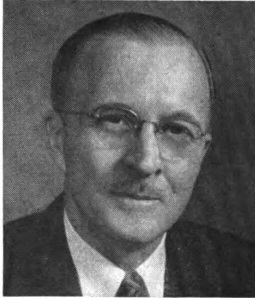
William Moore McCulloch was an American lawyer and politician who served as a Republican U.S. Representative for Ohio's 4th congressional district from 1947 to 1973.

The 1980 United States Senate election in New York was held on November 4, 1980. Incumbent Republican U.S. Senator Jacob Javits was defeated in the primary by Al D'Amato. D'Amato went on to win a plurality in the general election over Elizabeth Holtzman and Javits, who remained in the race as the candidate of the Liberal Party of New York.
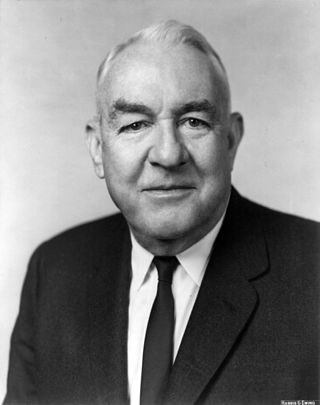
Samuel James Ervin Jr. was an American politician who served as a U.S. Senator from North Carolina from 1954 to 1974. A Southern Democrat, he liked to call himself a "country lawyer", and often told humorous stories in his Southern drawl. During his Senate career, Ervin was at first a staunch defender of Jim Crow laws and racial segregation, as the South's constitutional expert during the congressional debates on civil rights. However, unexpectedly, he became a liberal hero for his support of civil liberties. He is remembered for his work in the investigation committees that brought down Senator Joseph McCarthy in 1954 and especially for his leadership of the Senate committee's investigation of the Watergate scandal that led to the resignation of President Richard Nixon in 1974.
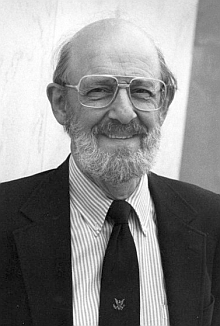
Emanuel Raymond Lewis was the longest-serving and final House Librarian for the United States House of Representatives Library in the U.S. Capitol Building. He was appointed House Librarian in 1973, and served in this position until January 1995, at which time the library, along with the House Historical Office, was reorganized and placed under the new Legislative Resource Center, a division of the Office of the Clerk. The House Library predated the Library of Congress, serving as the official repository of Congressional documents generated by the U.S. House of Representatives since 1792.

Daniel Sachs Goldman is an American attorney, politician, and heir; he is a member of the U.S. House of Representatives from New York's 10th congressional district. A politically progressive member of the Democratic Party, he previously served as the lead majority counsel in the first impeachment inquiry against Donald Trump and lead counsel to House Managers in Trump's impeachment trial which was also in 2019. Goldman is among the wealthiest members of Congress, with an estimated personal net worth of up to $253 million according to financial disclosure forms.




















